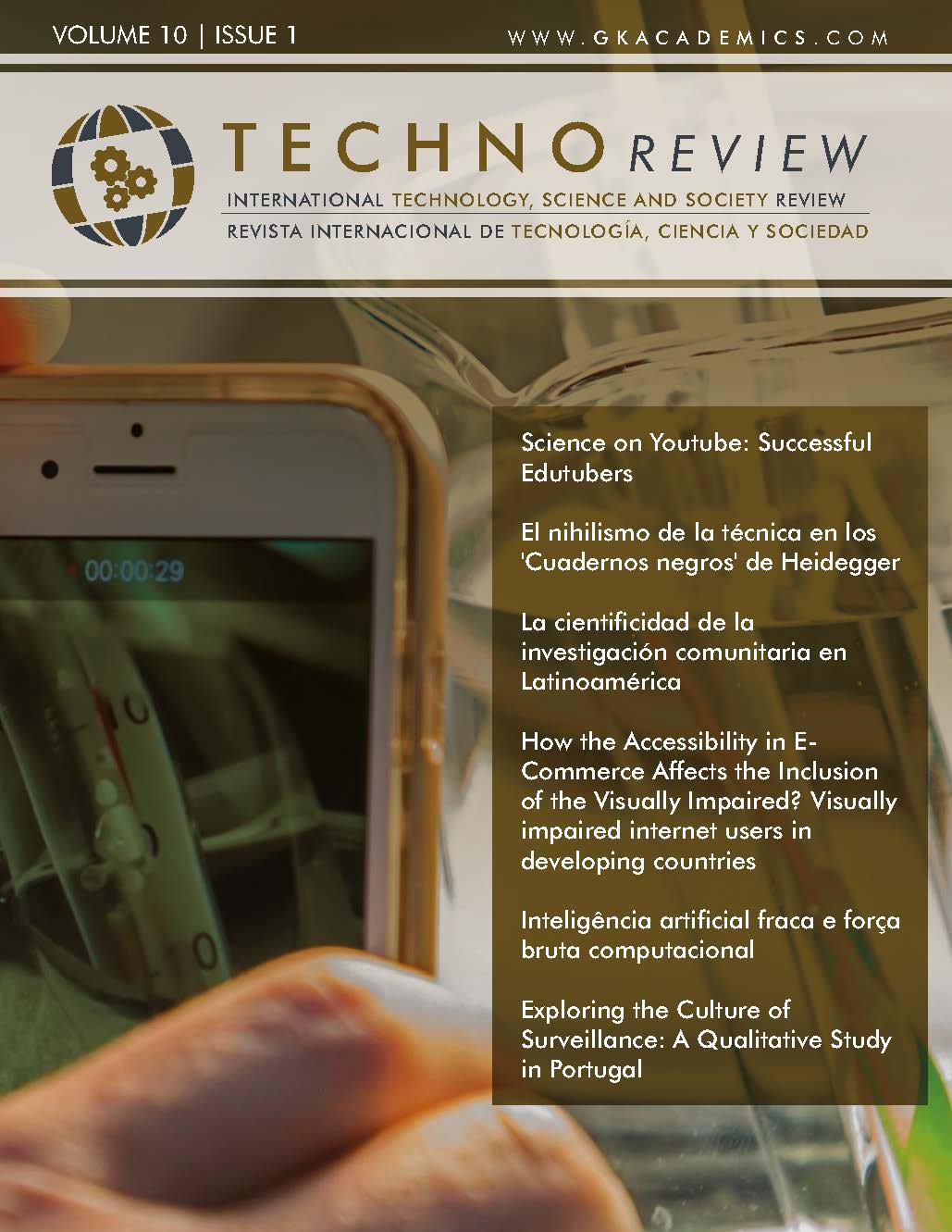Inteligencia artificial débil y fuerza bruta computacional
DOI:
https://doi.org/10.37467/gka-revtechno.v10.2815Palabras clave:
Inteligência artificial (IA), Maquína Univeral de Turing (MUT), inteligência artificial geral (IAG), GPT-3, cognição, hard problem, IA fraca, IA forte, ciências computacionais, força bruta computacional, crítica da tecnologiaResumen
O objetivo desse ensaio é refletir criticamente sobre a condição atual de nossos mais modernos sistemas de inteligência artificial, seus potenciais latentes, suas possibilidades técnicas, e também sobre suas intrínsecas limitações estruturais e funcionais. Para tanto, tomaremos como exemplo emblemático desta feita o novo GPT-3 da OpenAI, que é um poderoso sistema de inteligência artificial especialista, logo, um sistema concebido e usado segundo a teoria fraca da IA, que nada mais é do que um modelo de linguagem verbal artificial relativamente complexo, forjado estruturalmente com 175 bilhões de parâmetros e variáveis.
Citas
Aleksander, I.(2014). Machine consciousness: fact or fiction? In: Footnote: showcasing research with the power to change our world. Disponível em: . Acesso em: 17 ago. 2019.
Askell, A. (2020). GPT-3: Towards Renaissance Models. In Philosophers On GPT-3 (update with replies by GPT-3), DAILYNOUS: News Four and About the Philosopher Profession. Acesso em: 16/08/2020. Disponível em: <http://dailynous.com/2020/07/30/philosophers-gpt-3/>
Bostrom, N. (2018). Superinteligência: caminhos, perigos e estratégias para um novo mundo. DarkSide Books.
Buzsáki, G. (2006).Rhythms of the brain. Oxford University Press.
Chalmers, D. (2020). GPT-3 and General Intelligence. In Philosophers On GPT-3 (update with replies by GPT-3), DAILYNOUS: News Four and About the Philosopher Profession. Acesso em: 16/08/2020. Disponível em: <http://dailynous.com/2020/07/30/philosophers-gpt-3/>
Changeux, J. y Connes, A. (1995). Matéria e pensamento. Editora UNESP.
Crevier, D. (1996). Inteligência artificial. Acento Editorial.
Shevlin, H. (2020). A Digital Remix of Humanity. In Philosophers On GPT-3 (update with replies by GPT-3), DAILYNOUS: News Four and About the Philosopher Profession. Acesso em: 16/08/2020. Disponível em: <http://dailynous.com/2020/07/30/philosophers-gpt-3/>
Goldin, D y Wegner, P. (2004). The origins of the Turing thesis myth. Technical Report CS04-14. Brown University. Disponível em: . Acesso em: 17 ago. 2019.
Haikonen, P. (2003). The cognitive approach to conscious machines. Imprint Academic.
Goldin, D y Wegner, P. (2007). Robot brains circuits and systems for conscious machines. Wiley.
Herbert A, S. (1992). O computador-rei. In: PESSIS-PASTERNAK, Guitta (org.). Do caos à inteligência artificial: quando os cientistas se interrogam, pp. 223-232.
Motemayor, C. (2020). Language and Intelligence. In Philosophers On GPT-3 (update with replies by GPT-3), DAILYNOUS: News Four and About the Philosopher Profession. Acesso em: 16/08/2020. Disponível em: <http://dailynous.com/2020/07/30/philosophers-gpt-3/>
Negrotti, M. (2012). From the natural brain to the artficial Mind. In: SWAN, Liz. (org.), Origins of mind, v. 8: biosemiotics, Drodrecht: Springer Science+Business Media, pp. 399-410.
Parnas, D. (2017). The real risks of artificial intelligence. Communications of ACM, 60(10).
Quaresma, A. (2020). Inteligência artificial e bioevolução: Ensaio epistemológico sobre organismos e máquinas. Dissertação de Mestrado pelo programa de pós-graduação em Tecnologias da Inteligência e Design Digital (TIDD). Pontifícia Universidade Católica de São Paulo (PUC/SP).
Quaresma, A. (2020a). A falácia lúdica das três leis: Ensaio sobre inteligência artificial, sociedade e o difícil problema da consciência. In PAAKAT: Revista de Tecnología e Sociedad, número (no prelo).
Quaresma, A. (2019). Inteligências artificiais e o problema da consciência. In PAAKAT: Revista de Tecnología e Sociedad, 16(9).
Quaresma, A. (2018). Inteligências artificiais e os limites da computação. In PAAKAT: Revista de Tecnología e Sociedad, 15(8).
Rini, R. (2020). The Digital Zeitgeist Ponders Our Obsolescence. In Philosophers On GPT-3 (update with replies by GPT-3), DAILYNOUS: News Four and About the Philosopher Profession. Acesso em: 16/08/2020. Disponível em: <http://dailynous.com/2020/07/30/philosophers-gpt-3/>
Searle, J. (2017). Mente, cérebro e ciência. Edições 70.
Searle, J. (2006). A redescoberta da mente. Martins Fontes.
Searle, J. (2010). Consciência e linguagem. WMF/Martins Fontes.
Searle, J. (1998). O mistério da consciência. Paz e terra.
Sharkey, N, Wynsberghe, A.V., Robbins, S., & Honcoch, E. (2017). Consultation report our sexual future with robots. Disponível em: . Acesso em: 14 abr. 2019.
Vallor, S. (2020). GPT-3 and Missing Labor of Understanding. In Philosophers On GPT-3 (update with replies by GPT-3), DAILYNOUS: News Four and About the Philosopher Profession. Acesso em: 16/08/2020. Disponível em: <http://dailynous.com/2020/07/30/philosophers-gpt-3/>
Varela, F. (2017). Conhecer: as ciências cognitivas, tendências e perspectivas. Instituto Piaget.
Von neumann, J. (1996). Theory of self-reproducing automata. University of Illinois Press.
Descargas
Publicado
Cómo citar
Número
Sección
Licencia
Aquellos autores/as que publiquen en esta revista, aceptan los términos siguientes:
- Los autores/as conservarán los derechos morales sobre la obra y cederán a la revista los derechos comerciales.
- Transcurrido un año desde su publicación, la versión del editor pasará a estar en acceso abierto en la web de la editorial, pero la revista mantendrá el copyright de la obra.
- En el caso de que los autores deseen asignar una licencia abierta Creative Commons (CC), podrán solicitarla escribiendo a publishing@eagora.org







